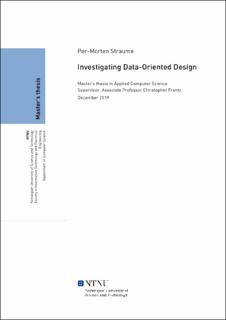| dc.description.abstract | This thesis investigates the topic of data-oriented design, a topic that has received little attention within the academic community, but is starting to receive popularity within the video games industry.
Through an in-depth review of academic and industrial literature I find that there is a difference in conceptualization and discussion of DOD between the industry and academic literature. The academic literature seems to see DOD largely as a set of patterns, while the industry takes a more holistic approach, viewing it as a way to solve given problems.
The understanding of DOD gained from the literature is extended through a set of in-depth interviews with industrial practitioners of DOD. With this extended understanding I arrive at the following aspects that I consider core characteristics of DOD.
1. Focus on solving your problem at hand, rather than a generic one
2. All kinds of data should be considered
3. Decisions should be made based on data
4. Focus on performance in a wide sense
Based on this gained understanding, I apply this to a case based exploration of DOD. The case focuses on streaming Building Information Modeling (BIM) models from disk into a VR application. This understanding and case solution is then validated by DOD industry practitioners with respect to the adherence to DOD principles. The practitioners agreed that I followed a DOD approach, but pointed out flaws/limitations in the execution of the approach, which led to new insights, such as the need for a stronger focus on verification and details, more generally the validation highlighted the challenge of arriving at a generalized conception of DOD. This supports the identified core characteristics of DOD (highlighted above).
In the end, DOD is a topic that is not well researched, which offers opportunities for more collaboration between the industry and academia. Recognising that DOD is a "simple concept that is hard to master", this thesis concludes by highlighting the skills necessary to learn and apply DOD in practical and curricular settings, specifically problem-centred analysis, understanding of modern hardware, understanding of tools, as well as statistical proficiency and thus provides instructive insights. Taking this work as a starting point, finally, the opportunities for future investigations into DOD are outlined. | en_US |
